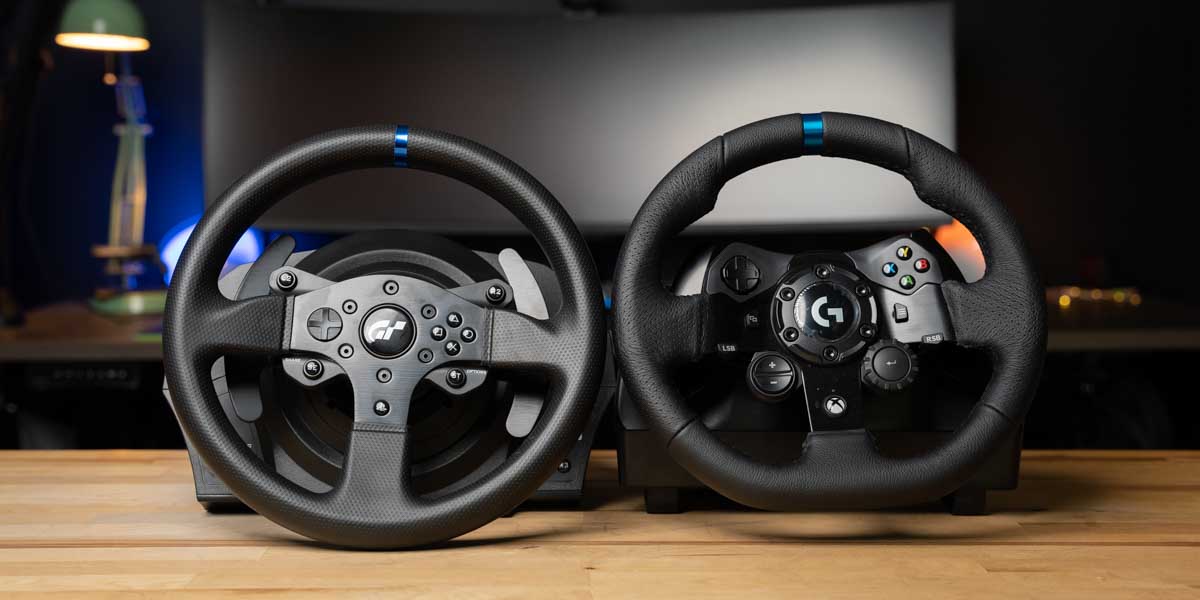
I’ve always enjoyed cars and wondered what racing would be like. Forza Motorsport and Forza Horizon 5 with a controller have been a fun way to scratch the itch, but I’ve always wondered what a sim racing wheel and pedal setup would be like. Combine that with getting into F1 thanks to the exciting 2021 season (and Netflix’s Drive to Survive series), and I decided to finally pull the trigger on a force feedback sim racing wheel and pedals. After reading plenty of reviews and Reddit posts, I was torn between the Logitech G923 and the Thrustmaster T300RS GT. I was able to get my hands on both, but I’ll only be keeping one. Which one did I choose? Be sure to stick around until the end because it was not the one I expected.
Why these two?
There are plenty more sim racing wheels out there, but from what I could tell, these wheel and pedal sets are the two most recommended for beginner sim racers who want to get a feel for the sport. There are cheaper options out there, but it’s worth it to get into the $400–$450 price range to get a good feel. For both steering feedback and pedal setups, these two are a great starting point that seasoned racers still use.
I don’t have a dedicated racing cockpit, so I’m mounting the wheels on my Flexispot desk. The Monoprice Darkmatter 49-inch monitor is also a great fit for sim racing.
If you want to go all out, there are direct-drive systems like those from Fanatec that are highly recommended, but they come at a much higher cost.
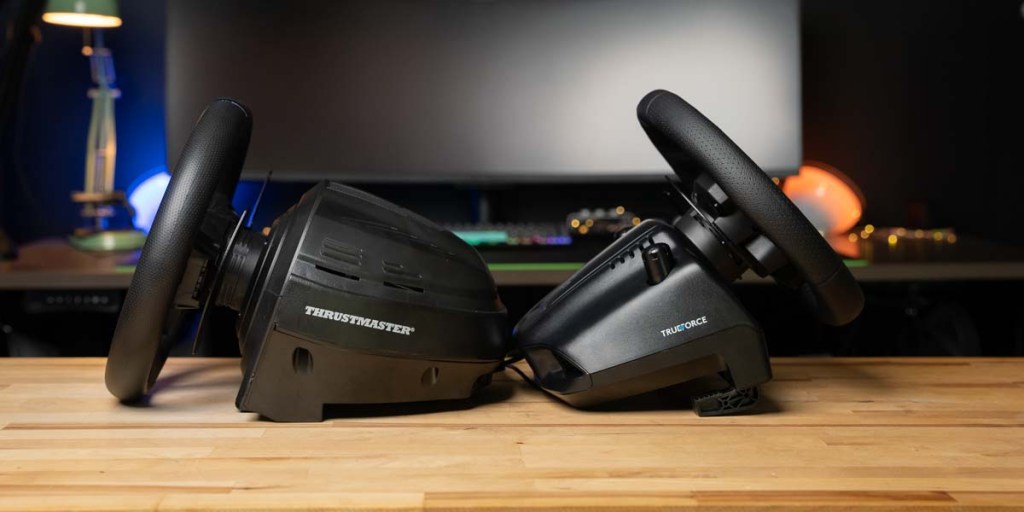
Quick overview
Here’s a brief introduction to each of the wheels, starting with the Logitech G923 with an MSRP of $400. An updated take on the popular G920/G29, the G923 has some upgrades that are key in my opinion. Mainly, the brake pedal has been upgraded with a progressive feel – more on that later. Two different versions both work on PC but have differences for Xbox or Playstation.
The Logitech G923 also uses a dual-motor setup with Logitech’s new Trueforce feedback system – more on that later.
Sim rig shootout: Video
Moving on to the Thrustmaster T300RS GT, it’s a bit more expensive at $450 but offers some key differences. Mainly, the force feedback system uses a belt drive that is more powerful than the G923. Typically, from my understanding, more power can lend itself to a more realistic feel.
Visually, it looks like a beast compared to the much smaller G923.
The other key difference is the ability to change out the steel wheel on the T300 wheel base. Thrustmaster has a ton of wheel options on its website if you want or need to upgrade or replace the wheel down the line.
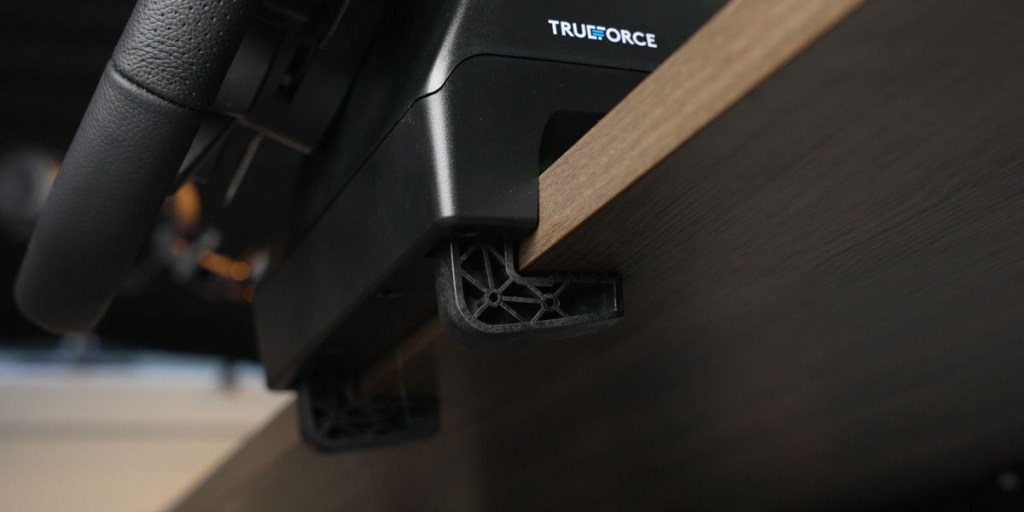
Setup and mounting
First up, let’s talk about the setup and mounting process. The Logitech G923 is pretty much ready to go right out of the box thanks to the non-removable wheel. Before mounting the wheelbase, though, the cables need to be plugged in and routed because the ports are in a cavity under the base.
With the cables routed, the G923 has simple and sleek mounting hardware. There are two large dials that can be locked down or pulled up to loosen and tighten the clamps under the wheelbase. While it doesn’t feel like it can put as much force as the T300 wheel base, it actually felt more secure in use.
On the Thrustmaster side, since the wheel comes removed from the base, the first step is installing that. With the wheel installed, the base can be mounted because the cables plug into the rear of the unit – which I wish the Logitech had as well.
There are software packages for both wheels that you’ll want to download, install, and ensure everything is up to date.
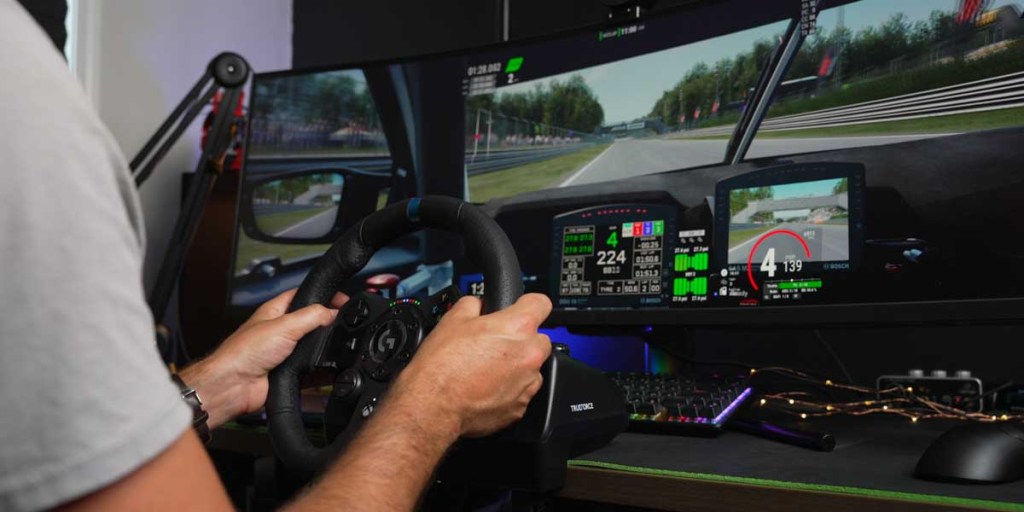
Force feedback
The main selling point of the Thrustmaster over the G923 is the increased power and its more silent operation due to the force feedback hardware. In my experience, though, both offer solid precise feedback.
One major difference on the Logitech G923, though, is the Trueforce feedback system. From Logitech’s marketing, this is supposed to give more fine detail through the wheel which can help assist in determining the car’s position on a track and what the wheels are doing.
In my experience, it kind of feels like Logitech just put a rumble pack in the Wheel. There is some significant vibration, and when moving over parts of the track like the serrated curbs, it can be quite loud. I heard this as a common comment when doing my research, but because my office isn’t near enough to anyone to disturb them when I’m playing racing games, it wasn’t a concern for me.
One note on Trueforce, though, it only works on certain games. It uses game-engine info to deliver force feedback through the wheel. Assetto Corsa Competizione is one supported title and that’s the main game I’ve been testing these wheels on.
I got the Xbox version of the G923, and when playing Forza Horizon 5 on my Series X, it was still just as loud – especially when offroading. I played this in my basement and my wife was yelling from the other room asking what was going on. If the volume is a concern, the Logitech G923 might not be the best fit.
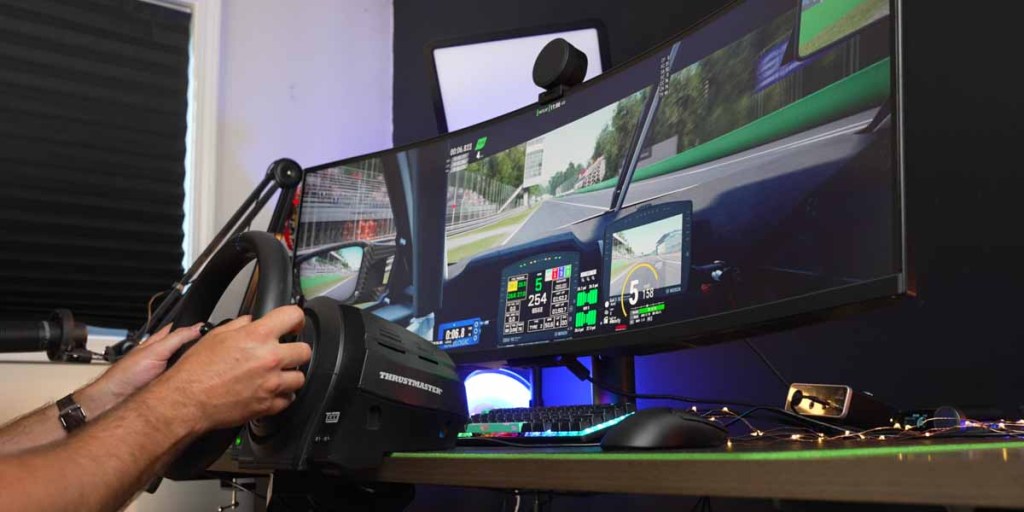
Thrustmaster is using a belt drive system that is much quieter and also offers more torque. I believe these are the two main reasons the T300RS GT is recommended so frequently. And, in my experience, it feels and sounds great. When you have to fight the wheel a little bit, it does give a more intimate sense of what is going on with the car, wheels, and track.
Overall, the Logitech is louder but offers some more detail – not in the way of power, but it the different types of feedback and vibrations that are sent through the wheel. It’s not a huge difference, but it can be a nice added touch.
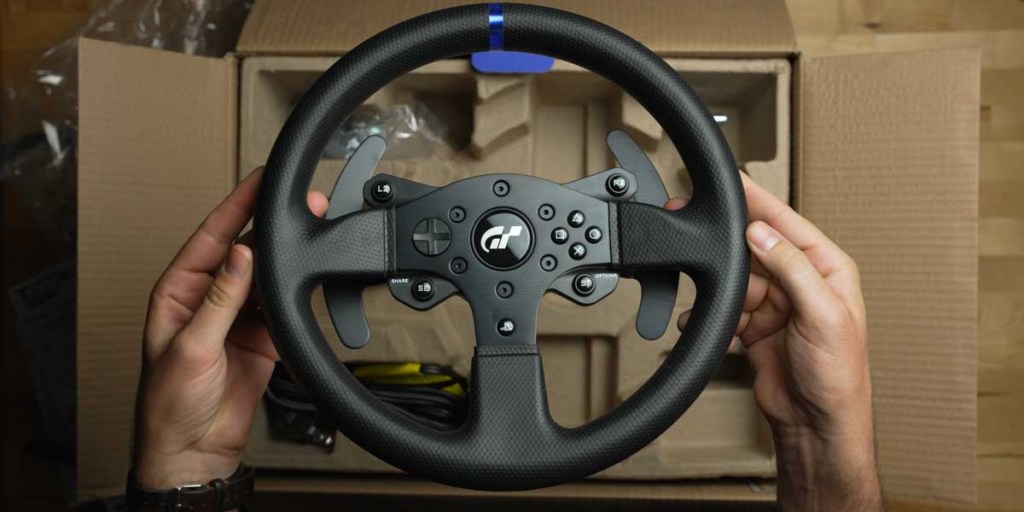
Wheel
For the steering wheels, I think Logitech takes the cake here. The stitched leather-wrapped wheel feels, looks, and smells more premium. Both feature a strip at the top to help center the wheel and quite a few controls on the front.
Both wheels are 11 inches. The G923 wheel offers a bit more variety with the controls thanks to a rotating dial and plus and minus buttons. But, on the Logitech G923, you are locked into that wheel. With the Thrustmaster T300RS GT, if you find that you’d like to try a different wheel down the road, it can be easily swapped out, upgraded, or replaced.
Behind the steering wheels are shift paddles that feel solid and have a nice tactile click on both wheels. The T300RS GT paddles are a bit larger but I never had an issue with the G923 paddles, either.
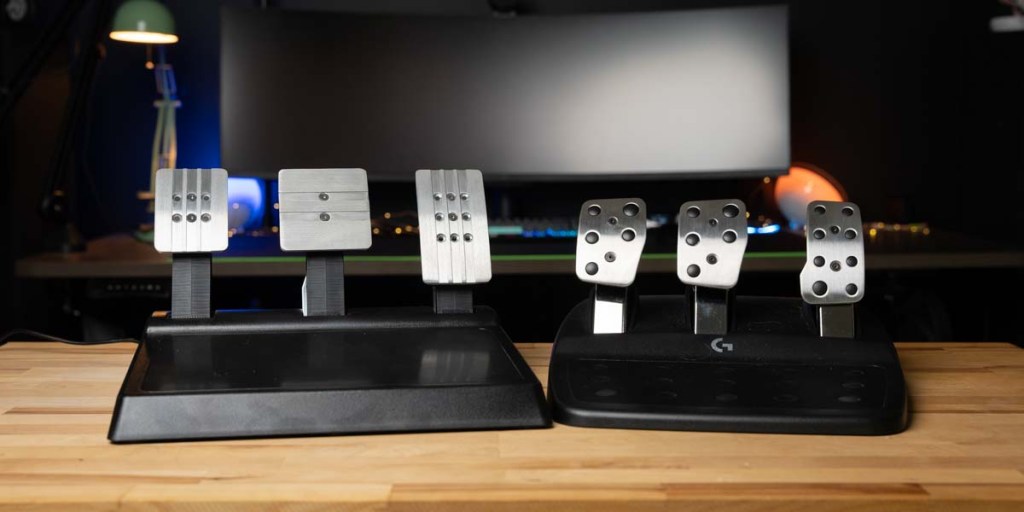
Pedals
Now let’s move into one of the biggest differentiators in my opinion – the pedal setups. Both of these sim racing wheels come with a three-pedal system. Both sets can be customized a bit by moving the metal pedal heads around the mounting arms.
One major win for the Logitech is the carpet grip system that works extremely well to keep the pedals planted on the carpet. There is a spring-loaded latch that will release a plastic spikey bar that grips into the carpet and keeps it in place under hard braking pressure.
For the Thrustmaster pedals, even though it doesn’t require as much pressure to fully press the brake pedal to the floor, the rubber grips weren’t enough to keep it in place on the carpet. I had to brace it with something else.
On the G923 – the pedals are one of the most notable upgrades over the older G920/G29. The brake pedal has a progressive spring system that increases resistance while the pedal is depressed. This makes it feel much more realistic and gives more feedback over a standard pedal.
Thrustmaster includes an optional “conical brake mod” that can be installed on any of the pedals, but it is mainly intended for the brake. And while it does add a bit more of a progressive feel at the end of the brake travel, it also shortens the brake pedal travel significantly and doesn’t have the same progressive feel as the G923. I preferred to have it off, but even so, I much preferred the brake feel of the G923 pedals.
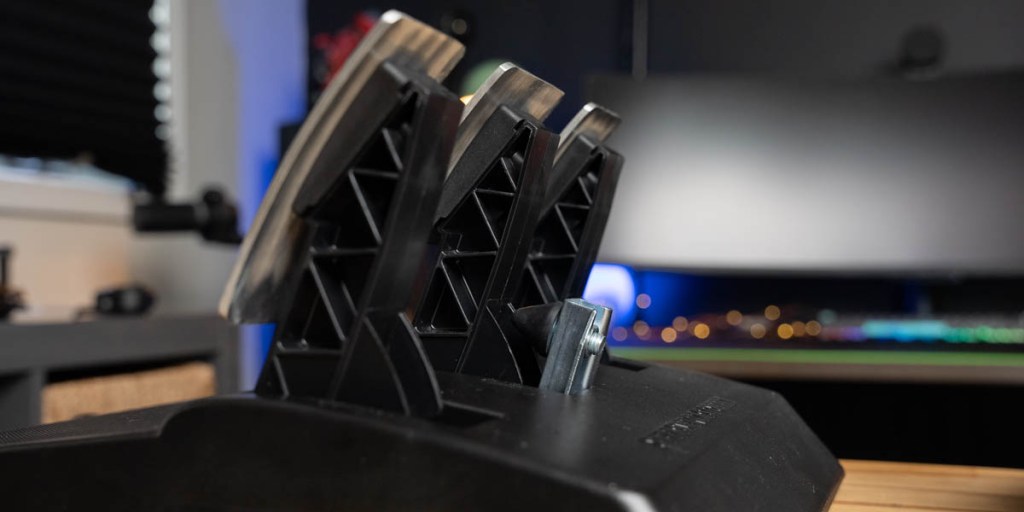
Software packages
On the software side, the G923 can be controlled from the Logitech G Hub app – just like many of its other gaming peripherals. Unsurprisingly, Logitech has a nifty UI to dial in operating range, sensitivity, and catering spring strength. There are also controls for Trueforce which can also be controlled from a compatible game like ACC.
Thrustmaster also has a program to update and adjust the T300RS GT. It isn’t as snazzy as the Logitech G Hub, but there is some nice functionality built in there. In addition to the ability to change max rotation angles, there is a tab where you can test forces with a variety of feedback scenarios to get an idea of how much power they will give to the wheel.
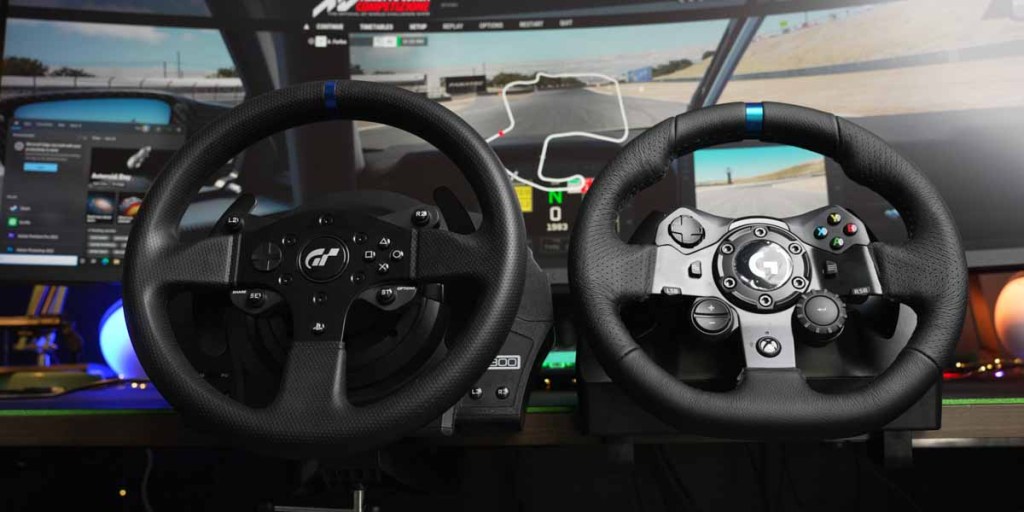
So, which one am I keeping?
After doing my research, I was set on the Thrustmaster T300RS GT. The idea of more powerful force feedback with the ability to swap out wheels was very enticing. But after getting them both in and experiencing the full package, I find myself leaning towards the Logitech G923.
I do appreciate how quiet and powerful the Thrustmaster T300RS GT wheel is, but I found myself gravitating towards the Logitech G923 – the main differentiator for me being in the pedals. Braking is such a big part of sim racing, and I have a better feel for the progressive system of the Logitech G923.
If I was concerned about playing in a quiet setting and not disturbing anyone, I might opt for the T300GT RS because it is much quieter, but that’s not something that I need to worry about in my current setup.
I’m very glad that I was able to test both of these sim racing wheels and am looking forward to spending more time behind the wheel.
What’s next?
While I’d love to invest in a direct drive system and give that a go to see what kind of a difference that would make, I still need to make sure that I will play enough sim racing games to warrant that purchase. I do know that Thrustmaster has teased some new hardware, and I hope I get to try that out when it’s released.
In the near future, though, I think I’ll be looking for an affordable racing cockpit to hard mount the wheel and pedals.
Buy Logitech G923
Buy Thrustmaster T300RS GT
FTC: We use income earning auto affiliate links. More.




Comments